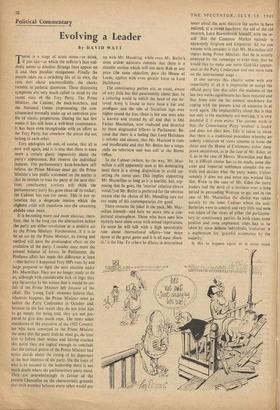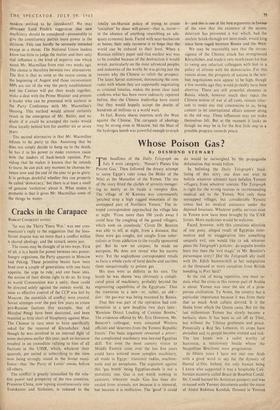Political Commentary
Evolving a Leader
By DAVID WATT rrI:. RE is a stage of acute stress—or drink, 1 if you like—at which the sufferer's face sud- denly seems to dissolve. Strange lines appear on it and then peculiar elongations. Finally the mouth takes on a twitching life of its own, the eyes dart about uncontrollably, the cheeks tremble in pathetic disunison. These distressing symptoms are very much called to mind by the recent state of the Tory Party. The Prime Minister, the Cabinet, the back-benchers, and the National Union (representing the con- stituencies) normally make up an unbroken pro- file of classic proportions. During the last few weeks it has still been a well-bred countenance. It has been even recognisable with an effort as the Tory Party, but somehow the pieces did not belong to each other.
Tory apologists tell one, of course, that all is now well again, and it is true that there is once more a certain glassy impassivity about the party's appearance. But observe the individual features. The parliamentary back-benchers still believe the Prime Minister must go; the Prime Minister's last public statement on the matter is that he intends to lead the party at the next elec- tion; constituency v, orkers still think the parliamentary party has gone clean off its rocker; the Cabinet has' run for Cover. This is not re- laxation but a desperate tension which the slightest crisis will transform into the screaming abdabs once more.
It is becoming more and more obvious, there- fore, that in the long run the alternatives before the party are either revolution or a positive act by the Prime Minister. Furthermore, if it is to be an act by the Prime Minister, its timing and method will have the profoundest effect on the evolution of the party. Consider once more the present balance of forces. In Parliament, the Profumo affair has made this difference at least —that before it happened Tory MPs were by and large prepared to fight the next election under Mr. Macmillan. They are no longer ready to do so, although with considerable lack of logic they pay lip-service to the notion that it. would be un- fair if the Prime Minister left because of the affair. The 'young Turk' elements believe that, whatever happens, the Prime Minister must go before the Party Conference in October and, because in the last resort they do not trust him to go simply for being told, they are not pre- pared to give him much rope. The more sober mandarins of the executive of the 1922 Commit- tee who have conveyed to the Prime Minister the news that the party feels he must go, do trust him to follow their wishes and having reached this point they are logical enough to conclude that the tactical genius of the Prime Minister had better decide about the timing of his departure in the best interests of the party. On the issue of who is to succeed to the leadership there is not much doubt where the parliamentary party stand.
They are overwhelmingly in favour of the present Chancellor on the characteristic grounds that each member believes every other would put up with Mr. Maudling, while even Mr. Butler's most ardent admirers concede that there is a sizeable section which will not. have Rab at any price (the same objection, pace the House of Lords, applies with even greater force to Lord Hailsham).
The constituency parties are, as usual, aware of very little but feel passionately about that. In a tottering world in which the head •of our be- loved Army is found to have been a liar and profligate and the tide of Socialism laps ever higher round the feet, there is but one man who is known and trusted by all and that is Old Father Macmillan, now traduced and deserted by those disgraceful fellows in Parliament. Be- yond that there is a feeling that Lord Hailsham is reliable and sincere, that Mr. Macleod is rude and insufferable and that Mr. Butler has a soapy smile on television and was soft at the Home Office.
In the Cabinet (where, by the way, Mr. Mac- millan is still apparently seen at his dominating best) there is a strong disposition to avoid up- setting, the status quo. This implies supporting Mr. Macmillan as long as it is feasible, but, sup- posing that he goes, the 'interim' solution (brave words!) of Mr. Butler is preferred for the obvious reason that the choice of Mr. Maudling cuts out too many of his contemporaries for good.
There remains the joker in the pack, Mr. Mac- millan himself—and here we move into a con- jectural stratosphere. Those who have seen him recently have come away with mixed impressions. To some he will talk with a high apocalyptic tone about international affairs—`one more throw at the great game and it is all nuns dunk- Its,' is the line. To others he dilates in determined tones about the next election (he seems to have enlisted, at a recent luncheon, the aid of the old maestro, Lord Beaverbrook himself, with the. re- sult that the Common Market episode is apparently forgiven and forgotten). All we can assume with certainty is that Mr. Macmillan still enjoys being Prime Minister, that he is acutely annoyed by the campaign to evict him, that he would like to make one more God-like appear- ance at the Party Conference and one more turn on the international stage. ■ If one surveys this chaotic scene with any impartiality at all it is impossible to accept the official party line that after the madness of the last two weeks equilibrium has been restored and that from now on the normal machinery for coping with the present kind of situation is at work again. The implausibility about this is that not only is the machinery not working, it is very doubtful if it even exists. The current myth is that the Conservative Tarty 'evolves' a leader and does not elect him. This is taken to mean that there is a traditional procedure whereby an orderly collection of views streams in from the shires and the House of Commons; either these prove unanimous, as in the case of Mr. Eden; or if, as in the case of Messrs. Macmillan and But-. ler, a difficult choice has to be made, some dis- creet and impartial nobleman consults the en- trails and decides what the party wants. Unfor- tunately it does not and never has worked like that. Even in the case of Mr. Eden the party leaders had the devil of a bUsiness over a long period in persuading. Winston to go; and in the case of Mr.' Macmillan the choice was taken quickly by the inner Cabinet where the anti- Butlerites were in control and very little real note was taken of the views of either the parliamen- tary or constituency parties. In both cases. some positive and even unpleasant steps had to be taken by'sonte definite individuals; `evolution' is a euphemism for 'graceful acceptance by the majority.'
Is this to happen again or is some more modern method to be introduced? We may eliminate Lord Poole's suggestion that new machinery should be considered—presumably to give the constituency parties more power in the decision. This can hardly be seriously- intended except as a threat. The National Union leaders know too little to judge the matter and their only real influence is the kind of negative one which saved Mr. Macmillan from rout two weeks ago. The choice is therefore between two alternatives. The first is that as soon as the recess conies at the beginning of August and those inconvenient MPs are out of the way the party establishment and the Cabinet will put their heads together. make a deal with the Prime Minister and present a leader who can be presented with acclaim at the Party Conference with Mr. Macmillan's blessing. This method would almost certainly result in the emergence of Mr. Butler, and no doubt if it could be' arranged the ranks would close loyally behind him for another six or seven years.
The second alternative is that Mr. Macmillan refuses to be party to this. Assuming that he does not simply decide to hang on to the death, he has it in his power to make common cause with the leaders of back-bench opinion. Pro- viding that he makes it known that he intends to leave, he can pick any moment he chooses be- tween now and the end of the year to go in glory.
It is perhaps doubtful whether this can properly be called `democracy,' but there is at least a smell of genuine `evolution' about it. What makes it probable is that it gives Mr. Macmillan some of the things he wants.































 Previous page
Previous page